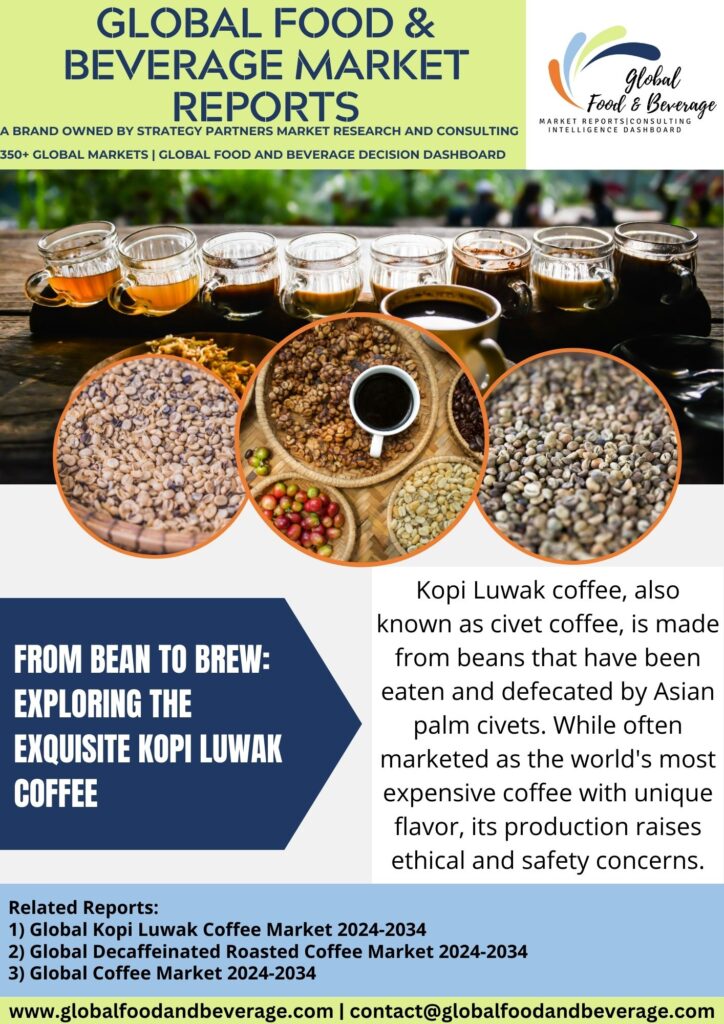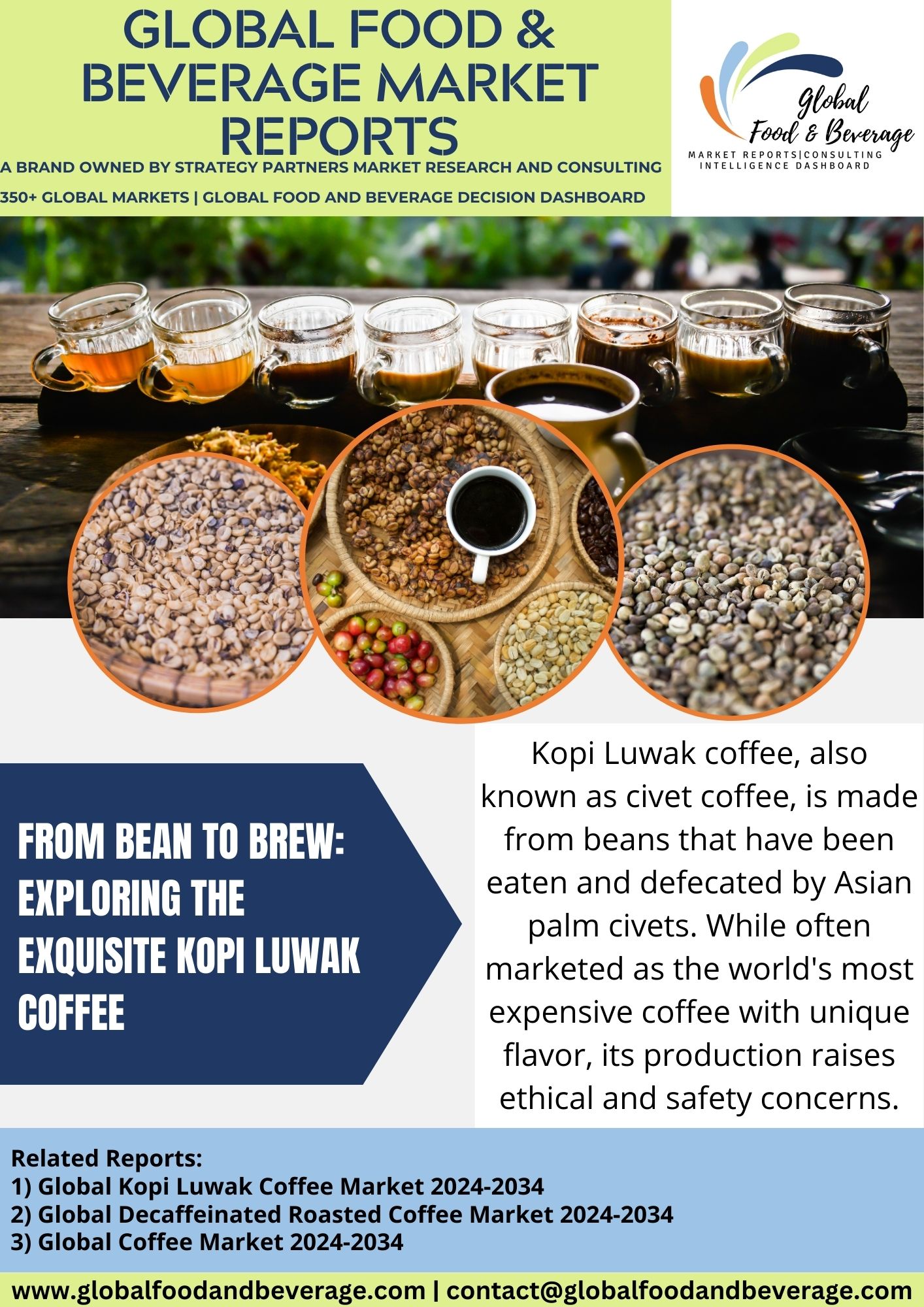
Kopi Luwak, often hailed as one of the rarest and most exotic coffees in the world, is a unique brew with a fascinating production process. Originating from Indonesia, particularly Sumatra, Java, and Sulawesi, Kopi Luwak is distinctively associated with the civet, a small mammal found in the region. The coffee’s name directly translates to “civet coffee” in Indonesian.
What sets Kopi Luwak apart is the unconventional method of production. Civets, nocturnal animals with a penchant for selecting only the ripest coffee cherries, consume the coffee fruit. The beans within the cherries pass through the civet’s digestive system, undergoing a fermentation process that supposedly imparts distinctive flavor characteristics to the coffee. Once excreted, the beans are collected, thoroughly cleaned, and subjected to further processing to yield the prized Kopi Luwak coffee.
The allure of Kopi Luwak lies in its reputed smoothness, low acidity, and unique flavor profile, often described as earthy, chocolaty, and with subtle fruity notes. Connoisseurs value its rarity and the labor-intensive process involved in its production, which contributes to its high market price. However, the ethical implications of civet coffee production have sparked concerns, as some operations involve confining civets in captivity for mass production, leading to questions about animal welfare.
Despite its exclusivity and intriguing backstory, Kopi Luwak has faced criticism related to ethical and environmental concerns. Unregulated production practices, including exploitation of civets and potential harm to the ecosystem, have led to calls for more sustainable and humane approaches to cultivate this unique coffee. Responsible and ethical Kopi Luwak producers have emerged, focusing on wild civet populations and natural processes to ensure both quality and ethical considerations.
ADVANCEMENTS
Kopi Luwak coffee, often referred to as civet coffee, has garnered attention for its unique production process involving the civet cat. Recent advancements in the world of Kopi Luwak focus on sustainability, ethical sourcing, and technological innovations.
One significant breakthrough is the emphasis on sustainable and ethical practices. Concerns about the treatment of civets in traditional Kopi Luwak production have led to increased awareness and efforts to ensure ethical sourcing. Some producers are implementing sustainable and humane civet coffee farming practices, emphasizing the well-being of the animals involved in the process.
Advancements in technology play a role in ensuring the authenticity and quality of Kopi Luwak. Blockchain and traceability systems are being utilized to track the entire supply chain, providing consumers with transparent information about the origin, processing, and authenticity of the coffee beans. This addresses concerns related to fraudulent or mislabeled Kopi Luwak products in the market.
The expansion of Kopi Luwak varieties and blends is another notable advancement. Producers are experimenting with different coffee bean varieties and roast profiles to offer a wider range of flavors and aromas, appealing to coffee enthusiasts seeking unique and premium coffee experiences.
The integration of Kopi Luwak into the specialty coffee market is evolving. Specialty coffee shops and roasters are recognizing the unique qualities of Kopi Luwak and incorporating it into their offerings, introducing this exotic coffee to a broader audience.
CHALLENGES
Kopi Luwak coffee, often referred to as civet coffee, faces challenges related to ethical concerns, sustainability, quality control, and market competition. One significant challenge is the ethical treatment of civets involved in the production process. Traditional methods of collecting coffee beans from civet feces raise animal welfare concerns, and ensuring ethical practices throughout the supply chain is crucial for maintaining the integrity of Kopi Luwak coffee.
Sustainability considerations are another challenge. Deforestation and habitat loss affecting civet populations, coupled with the potential overharvesting of wild civets for coffee production, raise environmental concerns. Implementing responsible sourcing practices and promoting sustainable civet coffee farming methods are essential for addressing these challenges.
Quality control poses ongoing challenges in the Kopi Luwak industry. The variability in the digestive processes of civets and the potential for unscrupulous practices, such as mislabeling or counterfeiting, can impact the flavor profile and authenticity of the coffee. Ensuring consistent quality and preventing fraud require stringent quality assurance measures.
Market competition is intense, with various specialty coffee options available globally. Successfully differentiating Kopi Luwak products, addressing consumer concerns related to ethics and sustainability, and staying competitive demand continuous innovation in sourcing, production, and marketing strategies.
Consumer perception and education are vital challenges for the Kopi Luwak industry. While some consumers are attracted to the unique production process and flavor profile, others may express ethical concerns about the treatment of civets. Effectively communicating ethical practices, sourcing transparency, and the unique characteristics of Kopi Luwak is crucial for building consumer awareness and trust.
CONCLUSION
Kopi Luwak coffee stands as a rare and exotic gem in the world of coffee, celebrated for its unique production process and rich flavor profile. From the jungles of Southeast Asia to the global coffee aficionado, its journey embodies a distinctive blend of adventure and luxury. The industry’s commitment to ethical sourcing and environmental sustainability reflects a nuanced approach to this exclusive brew. As consumers savor the rarest of beans, Kopi Luwak’s future promises both cultural reverence and responsible cultivation, ensuring its status as a cherished and ethically produced indulgence in the ever-evolving landscape of specialty coffees.
